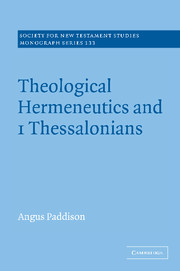Book contents
- Frontmatter
- Contents
- Foreword
- Preface
- List of abbreviations and notes about citation
- Introduction
- Part I The critical task
- Part II An exploration of some pre-modern readings of 1 Thessalonians
- Part III A proposed reading of 1 Thessalonians
- Conclusion
- Bibliography
- Index of Biblical references
- Index of authors
- Index of subjects
Conclusion
Published online by Cambridge University Press: 02 November 2009
- Frontmatter
- Contents
- Foreword
- Preface
- List of abbreviations and notes about citation
- Introduction
- Part I The critical task
- Part II An exploration of some pre-modern readings of 1 Thessalonians
- Part III A proposed reading of 1 Thessalonians
- Conclusion
- Bibliography
- Index of Biblical references
- Index of authors
- Index of subjects
Summary
In concluding this study, three tasks must be undertaken. First, it is worth reminding ourselves of the hermeneutical journey undertaken. Secondly, we must reflect on the integrity of Part III's conversational mode of interpretation. Thirdly, some departing images need to be offered through which and with which our theological exegesis might be best seen.
The hermeneutical journey travelled
The study began with a critique of hitherto dominant historical-critical readings of 1 Thessalonians. For James Dunn, offering a general defence of historical criticism, the Biblical text is ‘first and foremost’ a historical text, witnessing chiefly to a historically grounded communication. Dunn offers no consideration on how, free from the distracting concern with history and origins, the truth of Scripture resides within the rich field of meaning it creates. Similarly, for Karl Donfried the theology of 1 Thessalonians is only ever a meaning that originally served a situation lying in an event behind the text. In Donfried's reading of 1 Thessalonians, to understand the text's historical origins is to grasp its theological message. Both Dunn and Donfried reveal the dominance of historicist tendencies within New Testament studies, the assumption that to understand a text is equivalent to grasping its origins.
Historical-critical readings, it was then argued, are hampered by a restricted notion of meaning and truth; by an assumption that fixes the language of Scripture into a restrictively reflective relationship between text and original context; and by a misreading of Scripture's quality of ‘witness’.
- Type
- Chapter
- Information
- Theological Hermeneutics and 1 Thessalonians , pp. 187 - 196Publisher: Cambridge University PressPrint publication year: 2005



